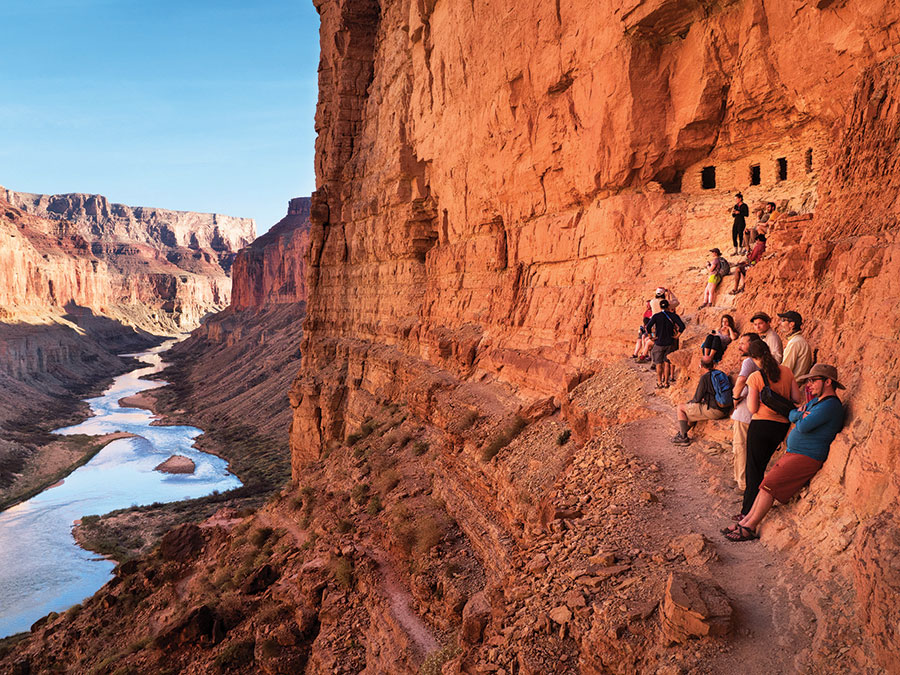 Group of UC Davis faculty, graduate students explore Grand Canyon through science education each year
Group of UC Davis faculty, graduate students explore Grand Canyon through science education each year
When it comes to public education, field trips are no foreign concept. UC Davis has continued to offer courses that take students out of lecture halls and into the real world to apply their knowledge.
The Center for Watershed Sciences on campus offers two courses in ecogeomorphology. These courses focus on combining a wide range of sciences from biology to geology and help students apply topics learned in class in field excursions.
“These [courses] are intensely field based, through experiencing locations for extended periods of time, you are not just near the river, you are in the river,” said Nicholas Pinter, a professor in the Department of Earth and Planetary Sciences and Center for Watershed Sciences.
The ecogeomorphology courses are offered to UC Davis students at the undergraduate and the graduate level. The undergraduate class that has been offered in the past is open to graduating seniors. It encompasses social, biological and physical sciences which are later tied into water sciences in relation to the Tuolumne River. Students participate in multiple field trips in this class and use data collected in the field and apply it to stream management.
The graduate class has a similar goal in combining multiple science fields and applying those fields to find stream management solutions. Within this class, students take a weeklong trip to the Grand Canyon, rafting in the Colorado River. The Grand Canyon serves as a prime location for educational research because it combines concepts of geology, biology, hydrology and more. Students who take the course get the opportunity to spend a week collaborating with faculty and other students from a wide range of backgrounds.
“We want these classes to be a truly interdisciplinary [experience],” said Sarah Yarnell, a research hydrologist at the Center for Watershed Sciences. “We want them to be as diverse as possible so students have the opportunity to learn from one another.”
Students from a variety of departments, ranging from geology to environmental engineering, have taken these courses. On the Grand Canyon trip, students spend time exploring the national park, coming up with hypotheses and working together in order to understand and interpret topics from class.
The trip involves rafting in the Colorado River, making multiple stops along the way to relate their surroundings to broader science concepts. These trips allow students to connect concepts learned in a class and use them to solve real-world problems. These classes introduce students to possible careers after their time at Davis by placing them in the field.
“Every year all students that go through the ecogeomorphology classes, both at the graduate and undergraduate level, say it’s their favorite class they have ever taken,” Yarnell said. “They have learned the most from these classes, and some of our students have even completely changed directions with what they want to do after they graduate.”
While these trips are beneficial for students in the long run, they are expensive to operate, and funding is difficult. Unfortunately, because of this, there is only a limited amount of students who are allowed to enroll in these courses.
Although this is the case, many UC Davis departments have been working on attempting to offer more of these types of classes and allowing more people to enroll in the ecogeomorphology courses.
“We’re trying to expand the offerings,” Printer said. “We think that these expeditionary classes (field-based classes) are really what Davis knows best and we’re trying to pull together colleagues in other departments to offer many more of these options.”
With this in mind, more students have found interest in getting involved with science not only outside of the classroom setting, but also collaborating with others outside of their own fields. Through collaborations and experience, students have the opportunity to expand and apply their learning.
“For those who work in the natural and physical sciences, there is nothing better than […] hiking, floating, sleeping, eating, living in […] the subject you are studying,” said Jeffrey Mount, the founding director of the UC Davis Center for Watershed Services.
Written by Molina Hauv — science@theaggie.org



